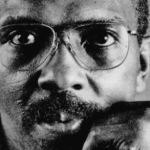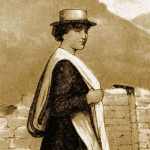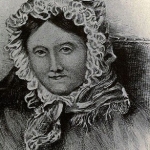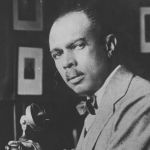Adapted to the case of Mr. S.,
Fugitive from Tennessee.
I’m on my way to Canada,
That cold and dreary land;
The dire effects of slavery,
I can no longer stand.
My soul is vexed within me so,
To think that I’m a slave;
I’ve now resolved to strike the blow
For freedom or the grave.
O righteous father,
Wilt thou not pity me?
And aid me on to Canada,
Where colored men are free.
I heard Victoria plainly say,
If we would all forsake
Our native land of slavery,
And come across the Lake.
That she was standing on the shore,
With arms extended wide,
To give us all a peaceful home,
Beyond the rolling tide.
Farewell, old master!
That’s enough for me—
I’m going straight to Canada,
Where colored men are free.
I heard the old-soul driver say,
As he was passing by,
That darkey’s bound to run away,
I see it in his eye.
My heart responded to the charge,
And thought it was no crime;
And something seemed my mind to urge,
That now’s the very time.
O! old driver,
Don’t you cry for me,
I’m going up to Canada,
Where colored men are free.
Grieve not, my wife—grieve not for me,
O! do not break my heart,
For nought but cruel slavery
Would cause me to depart.
If I should stay to quell your grief,
Your grief I would augment;
For no one knows the day that we
Asunder might be rent.
O! Susannah,
Don’t you cry for me—
I’m going up to Canada,
Where colored men are free.
I heard old master pray last night—
I heard him pray for me;
That god would come, and in his might
From Satan set me free;
So I from Satan would escape,
And flee the wrath to come—
If there’s a fiend in human shape,
Old master must be one.
O! old master,
While you pray for me,
I’m doing all I can to reach
The land of Liberty.
Ohio’s not the place for me;
For I was much surprised,
So many of her sons to see
In garments of disguise.
Her name has gone out through the world,
Free Labor, Soil, and Men;
But slaves had better far be hurled
Into the Lion’s Den.
Farewell, Ohio!
I am not safe in thee;
I’ll travel on to Canada,
Where colored men are free.
I’ve now embarked for yonder shore,
Where man’s a man by law,
The vessel soon will bear me o’er,
To shake the Lion’s paw.
I no more dread the Auctioneer,
Nor fear the master’s frowns,
I no more tremble when I hear
The beying negro-hounds.
O! old Master,
Don’t think hard of me—
I’m just in sight of Canada,
Where colored men are free.
I’ve landed safe upon the shore,
Both soul and body free;
My blood and brain, and tears no more
Will drench old Tennesse.
But I behold the scalding tear,
Now stealing from my eye,
To think my wife—my only dear,
A slave must live and die.
O, Susannah!
Don’t grieve after me—
For ever at a throne of grace,
I will remember thee.



















Comment form: